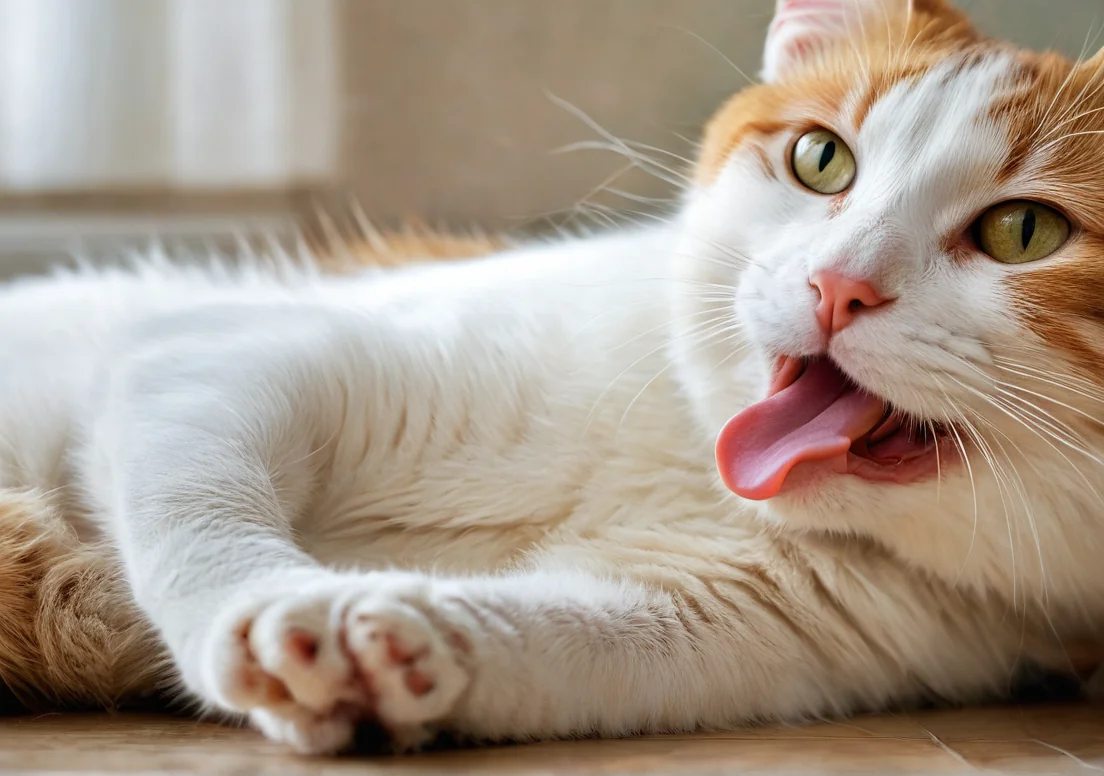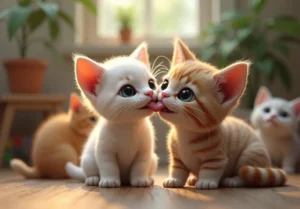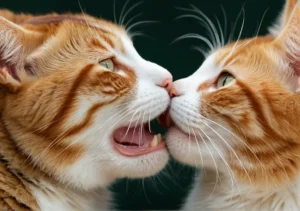You’ve probably felt that familiar, unexpected sensation of a cat’s tongue giving your feet a good lick. It’s peculiar, isn’t it? If you’ve ever wondered why your feline friend might be so drawn to your toes, you’re not alone.
Cats often lick feet as a sign of affection, curiosity, or even to mark their territory with their scent. But there’s a fascinating layer under this straightforward explanation; your cat’s behavior can tell you more about their personality and your relationship than you might realize. Keep reading to uncover the intriguing reasons behind your cat’s foot-licking habits.

What does licking signify for cats?
Licking is a multi-faceted behavior in cats, rich with meaning and nuance. First and foremost, it’s a way for them to show affection. When your cat licks your feet, it’s akin to a gentle hug or nuzzle—an expression of their love and bonding with you. This behavior can stem from kittenhood, where mother cats groom their young as a way to provide comfort and care.
Beyond affection, licking also serves instinctual purposes. Cats are naturally inclined to groom themselves, a practice that promotes cleanliness and social bonding. When they lick you, it might be an honorary grooming ritual—signaling acceptance and trust. Additionally, some cats engage in licking as a way to self-soothe. If your feline friend is feeling anxious or stressed, they may turn to licking as a calming mechanism, creating a comforting backdrop in their environment.
Ultimately, your cat’s licking can hint at several emotions and instincts—love, bonding, or self-comforting. Understanding these meanings can help deepen your connection with your furry friend and highlight their unique personality.
Is your scent attracting your cat?
Cats have an astonishing sense of smell, making it no surprise that they’re drawn to various scents you exhibit, including those emanating from your feet. Your feet carry a lot of unique smells—some pleasant and some, well, not so much! Here’s how your scent can pique your cat’s interest:
Pheromones : Cats have scent glands located in their paws, face, and other areas. They may be attracted to the natural pheromones on your skin, which communicate various emotional states.
Familiarity : Your specific scent helps provide a sense of comfort. By licking your feet, your cat is reinforcing their connection with you, essentially saying, “You smell like home.”
Curiosity : Cats are inherently inquisitive creatures. If you’ve recently walked in interesting environments—like a new park or a friend’s home—your feet might carry exciting new scents that captivate their attention.
Texture Delight : The texture of your skin can also play a role. Cats enjoy different surfaces, and your feet might feel particularly pleasing under their tongue.
Taste Testing : It’s not just about the smell! If you’ve been cooking or snacking, there’s a chance tasty remnants linger on your skin, enticing your cat to explore.
By understanding the interplay between scent and behavior, you can appreciate why your cat might engage in foot-licking as a sweet, quirky form of communication and bonding. Keep that in mind next time your cat shows some foot-focused affection.
Could it be a grooming instinct?
Cats are naturally inclined to groom themselves meticulously, and this instinct can extend beyond just their own fur. When your cat licks your feet, it might be expressing its own grooming behavior as a sign of affection. In a multi-cat household, you may notice one cat grooming another, which builds social bonds.
When your kitty turns to your feet, it’s likely trying to include you in its grooming rituals, showing trust and love. It feels secure in your presence, hence offering a little feline TLC.
It’s also worth noting that cats have scent glands located in their paws, which could mean your cat is marking you as part of its territory. This can be a form of categorizing you within their social structure, further indicating a level of comfort and affection.
To encourage this bond, consider engaging in more interactive play or providing cozy spaces for your cat to relax near you.
What about stress or anxiety?
If your cat is licking your feet out of the blue, it could be a sign of stress or anxiety. Cats can be sensitive creatures, and various changes in their environment—like moving to a new home, introducing new pets, or even loud noises—can trigger anxiety.
Licking acts as a self-soothing behavior. It’s similar to how humans might chew on their nails or fidget when feeling uneasy. If your cat is licking excessively or seems to be doing it compulsively, take note of the surrounding circumstances.
Here are some potential reasons behind this behavior:
- Changes in environment: New furniture, different people, or even smells can unsettle your cat.
- Health concerns: If the licking is persistent, it might indicate discomfort from a medical issue, so a vet visit could be a good idea.
- Boredom: Sometimes, a lack of stimulation makes a cat more prone to licking.
To help your furry friend find calm, create a safe space for them to retreat to. Consider interactive toys to keep them engaged or even simple calming techniques like playing soft music. Plus, ensuring a routine can help reduce their anxiety and provide structure in their day-to-day life.
Are they seeking attention?
Cats have a unique way of communicating, and licking your feet could be one of their more quirky methods to get your attention. This behavior may seem odd, but it often comes from a desire for interaction or affection. Cats are social creatures, and they may see your feet as the easiest part of you to engage with, especially if you’re busy or moving around.
If your feline friend licks your feet while you’re relaxing or working, they might be trying to say, “Hey, notice me!” This licking can also be a form of affection, similar to how they groom themselves or each other. Cats use their tongues to bond and establish social connections. So, if your kitty is lapping at your toes, it may be a way of showing love.
To encourage positive interactions, consider responding affectionately—petting or talking to them can reinforce that licking leads to the attention they crave. On the flip side, if you’re not a fan of the foot-licking, try redirecting their energy with playtime or new toys.
How do environmental factors play a role?
The environment can greatly influence your cat’s foot-licking behavior. Here are a few factors to consider:
- Stress levels: A chaotic household or recent changes like moving or new pets can trigger licking as a self-soothing behavior for your cat.
- Scent markers: Cats have a keen sense of smell, and they might be attracted to your feet due to odors from the shoes you wear or the surfaces you walk on, which may smell comforting to them.
- Temperature: Cats are naturally attuned to their surroundings, and if your feet are warm, they may simply find it enjoyable or soothing to lick them, especially on cold days.
Most often, a relaxed environment encourages your cat to feel secure and confident. Well-structured routines, plenty of playtime, and a safe space can reduce unnecessary licking. If you notice this behavior increasing, it might be worth examining changes in your cat’s environment to assess their comfort level.
Lastly, keep an eye on their overall habits—excessive licking could indicate stress or anxiety, so a calming environment might be just what they need.
What are the breed-specific behaviors?
Certain cat breeds are notorious for their unique rituals, and licking your feet might just be one of them. Siamese cats, for instance, are highly social and affectionate. Their propensity to lick and groom their owners is an expression of their social nature, akin to bonding behavior seen in a cat colony. Bengal cats often exhibit playful and energetic behaviors, and licking or biting might just be part of their playful interactions.
On the flip side, the more independent breeds like the Persian or British Shorthair may show less licking, preferring instead to maintain their personal space. The extent to which your cat licks your feet can mirror its own personality traits. Think of it as a quirky love language, where some cats are just more inclined to express fondness through grooming.
Fun facts about cats and grooming
Grooming transcends mere tidiness for cats; it’s a complex behavior loaded with significance. First off, did you know that cats spend around 50% of their waking hours grooming themselves? It’s their way of helping regulate temperature, maintaining a healthy coat, and even distributing natural oils for skin health.
Moreover, grooming acts as a stress reliever. Cats may lick your feet if they’re seeking comfort or feeling anxious. It’s a way to engage with you, creating a bond while offering themselves a sense of security.
Here’s a quick rundown of some captivating grooming behaviors:
- Social bonding: Cats groom each other, strengthening relationships within a group.
- Scent marking: When they lick you, they’re leaving their scent as a sign of affection. You’re part of their territory!
- Relaxation ritual: Licking releases endorphins, making it a calming activity for your feline.
Understanding these grooming habits sheds light on your cat’s unique quirks and their feelings toward you. Just remember, if the licking becomes excessive, it might be worth checking in with your vet to rule out skin irritations or stress-related issues.
What should you do if it annoys you?
If your cat’s foot licking is driving you up the wall, you can take steps to gently redirect this behavior without jeopardizing your relationship.
First, consider giving your kitty some alternative options. Keeping their focus on something else can help. Try offering toys with different textures, or even a cozy blanket for them to knead. Investing in a textured cat scratcher may also catch their interest, diverting their attention from your feet.
Next, use positive reinforcement. When your cat chooses to engage with their toys instead of licking your feet, reward them with treats or affection. This way, they’ll start associating fun with those alternatives rather than your toes.
Make sure to establish boundaries. When your cat approaches your feet for a lick, gently redirect them without startling them. A gentle “no” or lightly moving your feet can signal that it’s not okay. Remember, consistency is key. If you always respond the same way, they’ll gradually pick up on your cues.
Another useful tip is to keep your feet covered when you’re at home. Slipping on some comfy socks or slippers can not only prevent the licking but also reduce temptation.
Lastly, a unique angle here is the use of scent deterrents. Certain scents are unappealing to cats, like citrus or vinegar. Lightly spraying these scents on your feet (not directly on the skin, of course) can discourage your furry friend from engaging in foot licking while being harmless and effective.
Incorporating these strategies can make life a little more peaceful while keeping your bond intact.
Alex, a passionate animal lover, has experience in training and understanding animal behavior. As a proud pet parent to two dogs and three cats, he founded AnimalReport.net to share insights from animal experts and expand his knowledge of the animal kingdom.




